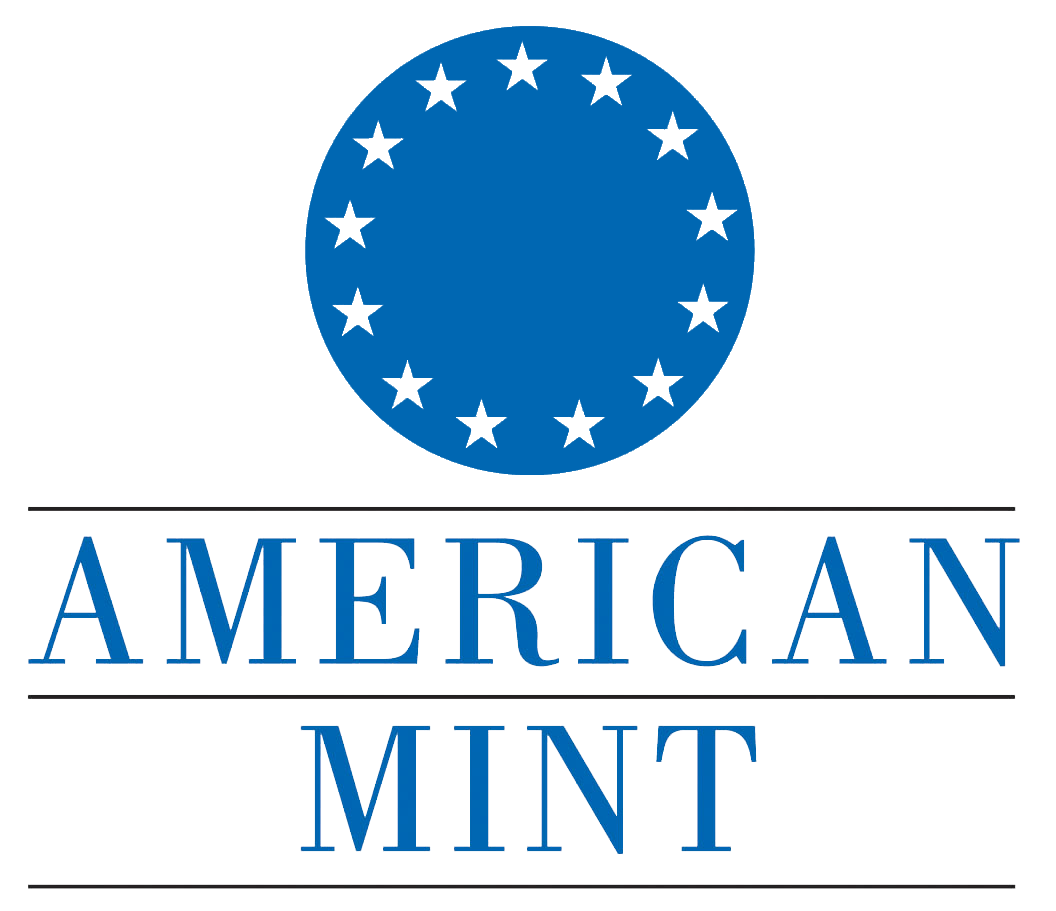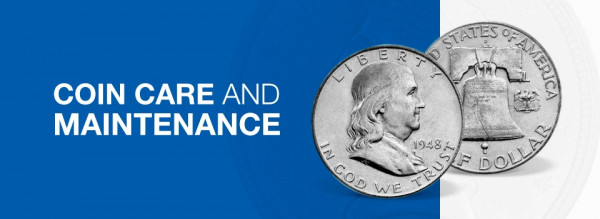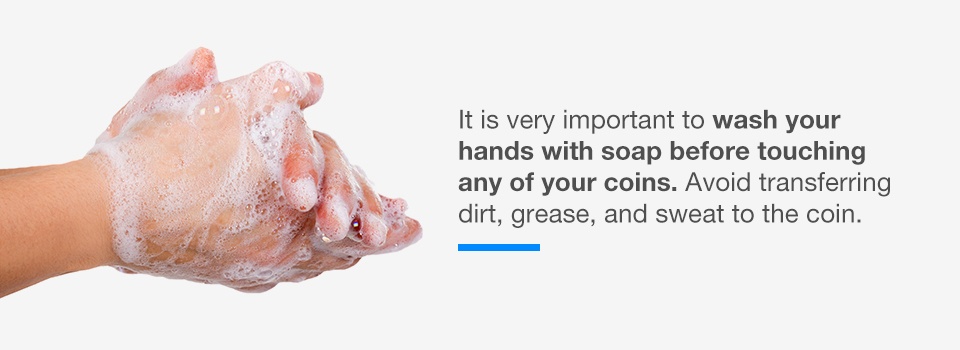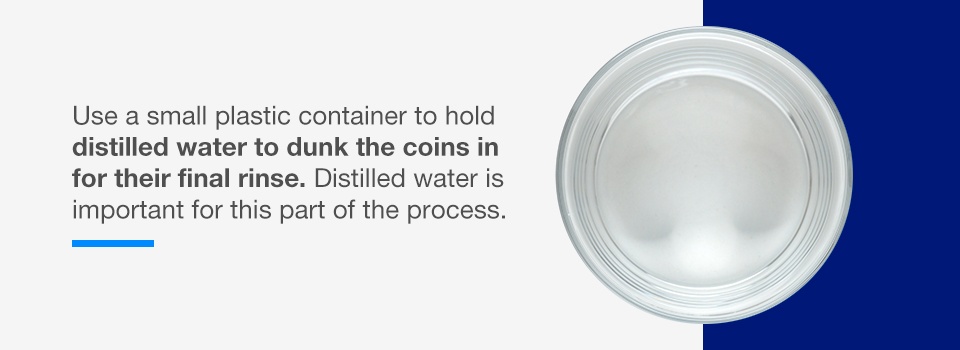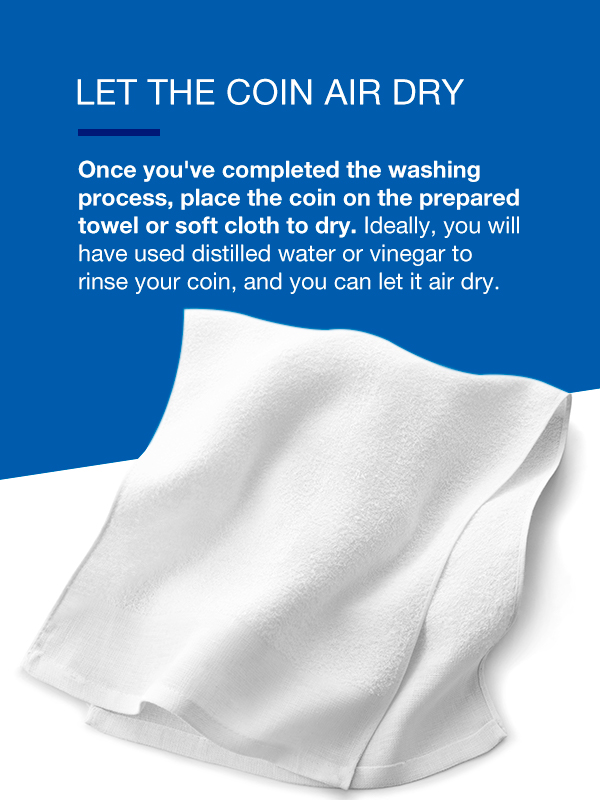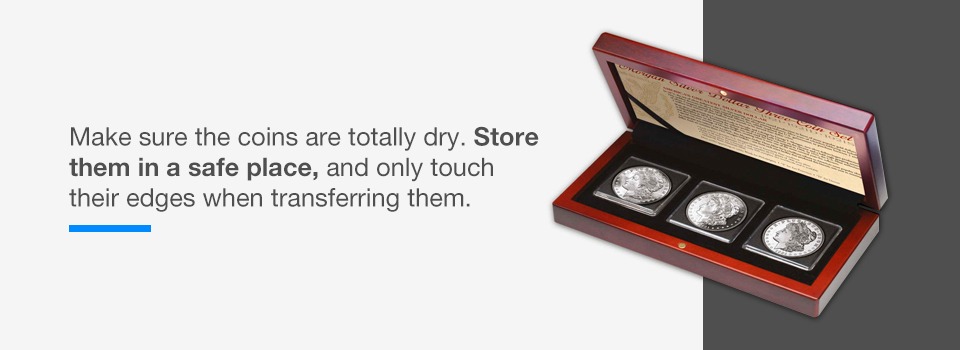Whether you're new to coin collecting or you've been a collector for a while, you've probably found yourself staring at a dirty coin and wondering what is the best way to clean old coins? Even the best-kept coins are bound to develop a bit of grime, so it's good to know what cleaning options are available when the gunk starts to build up.
Coin collectors actually appreciate some types of tarnish as an indication of age and authenticity, so it may be wise to get a professional coin dealer's opinion before accidentally washing away a rare coin's value. But if you have some dirty circulation coins, like dimes or quarters, you may consider cleaning them yourself.
Although cleaning your coins if you're not a professional can be risky, this article will discuss how you can clean coins in a way that minimizes the risk. Keep reading to find out the best and safest way to clean old coins.
How to Clean Collectible Coins
The answer to, "How do you clean collectible coins?" is simple — you don't. This may be surprising, but cleaning your most valuable coins on your own isn't always the best for maintaining them. If you want your coins to look their best, you need to protect them from ever needing to be cleaned in the first place.
The danger of cleaning your coins lies in accidentally scratching the coin's surface and diminishing its value. Instead of having a nice, shiny clean coin after washing it, you could end up with a scuffed-up, ruined piece of metal if you're not careful.
Another reason you may avoid cleaning your coins is that a natural tarnish, known as "toning," can actually increase some coins' value. Without these signs of age, it can be difficult to prove whether a coin is authentic. This is true for coins you've collected and for coins you may have inherited.
Ultimately, cleaning your coins yourself may not be worth the risk. If you haven't been thoroughly trained on how to clean valuable coins, take your coin collection to a local coin dealer to have them cleaned by a professional.
Preventative Care for Collectible Coins
In a perfect world, you could protect your coins from needing to be cleaned. Although this might be a bit idealistic, there are some measures you can take to keep your coin cleaning to a minimum. Here are some tips for keeping your coins in mint condition:
- Handle them with care: To keep the harmful oils and acids on your skin from damaging your coins, only touch their edges by holding them between your index finger and thumb.
- Get gloves: Because it can be difficult to avoid ever touching a coin's surface, wear soft cotton gloves when handling your coins.
- Stay food-free: To prevent any residue from getting on your coins, keep food and drink far away from your collection.
- Consider a mask: Wearing a mask is optional when handling coins, but do be aware that even the moisture from your breath can affect a coin's chemical makeup.
- Cushion your coin: If you ever need to put a coin down somewhere other than its holder, place it on a soft, clean surface.
- Store safely: How you store your coins can make all the difference. Keep your coins in protective pouches or capsules, and be careful not to scratch them when you slide them out.
What Is the Best Way to Clean Dirty Coins?
Although you should avoid cleaning your coins as much as possible, there may be times when it is necessary. If you need to clean your coins but can't take them to a professional coin cleaner, there is an easy way to clean coins at home. Still, try to clean only circulating coins on your own and wait to have other more valuable coins cleaned when you have access to a professional.
The number one rule to remember when cleaning your coins is to maintain a light touch. Never scrub or aggressively rub your coins, as harsh actions like those can be abrasive to coins. In addition, try to avoid touching the surface of your coins and touch only the outer edges.
Before you begin, gather your cleaning materials so you're not running around to find things during the washing process and potentially re-dirtying your hands. Round up your containers, soap, distilled water, and towel before touching your coins so you can go through the cleaning process smoothly from start to finish.
Once you have your supplies, follow these 10 steps for how to safely clean coins:
1. Wash Your Hands
It is very important to wash your hands with soap before touching any of your coins. If you don't, the dirt, grease, sweat, or other particles on your fingers could get transferred to the coin. Once on the coin, these substances could lead to unsightly spots on the surface or cause the coin to wear. If you want to be extra safe, wear gloves to clean your coins.
2. Put Down a Soft Towel
Placing a soft towel on your washing surface can serve as a convenient place for your coins to dry and a safety net to catch them if you drop one. Folding a soft cloth or towel a couple of times before laying it down can add extra cushion to your work area.
3. Prepare a Soapy Bath
Fill a small plastic container with enough warm water to submerge a coin completely. For the cleanser, squeeze a tiny amount of mild dish detergent into the container and let it suds up.
Be sure you use a plastic container for this step because a harder surface like glass or metal could scratch your coins. Tupperware and other disposable food containers are perfect for this part of coin cleaning.
4. Get the Final Rinse Ready
Use another small plastic container to hold distilled water to dunk the coins in for their final rinse. Distilled water is important for this part of the process. Most water is treated with fluoride, which may cause a chemical reaction with coins comprising several kinds of metals. Do everything you can to use distilled water for this step, but if you can't get distilled water, hot running tap water can replace it.
5. Clean Your Coins Carefully
The best way to clean old coins is one by one. Putting all of them in the container at the same time could cause them to bump against each other and scratch themselves.
To start, pick up a coin and immerse it in the warm water. Gently rub the coin between your fingers, being extra careful to move all stickiness, gunk and dirt away from the center of the coin toward the edges. Working in this outward pattern, you can wipe away the gunk from the edge of the coin with your thumb.
6. Rinse Your Coin
After washing the coin in soapy water, turn on warm running water to rinse the coin off. As you begin to rinse your coin, remember you should never scrub. Instead, lightly rub the coin until it no longer has any soap residue on its surface.
Hold the coin by its edges and let the running water do most of the work by moving the coin quickly under its stream to dislodge any remaining grit. Using your hands could end up grinding the grit further into the coin and scratching it instead of cleaning it.
7. Complete the Finishing Rinse
Holding the coin by the edges once again, swish the coin in the distilled water to get rid of any chemicals the tap water may have left on its surface. If you really want to be certain you removed any potential chemicals from your coin, soak it in vinegar for about a minute after it comes in contact with tap water.
8. Let the Coin Air Dry
Once you've completed the washing process, place the coin on the prepared towel or soft cloth to dry. Ideally, you will have used distilled water or vinegar to rinse your coin, and you can let it air dry. If you had to use hot tap water to rinse your coin, you will need to pat it dry gently to avoid any spotting. In this case, use a soft cloth towel or lint-free tissue and be extremely diligent to pat, not rub.
9. Repeat the Cycle
Keep washing your remaining coins one by one until they are all clean. For a particularly dirty coin that needs to soak more, set it in a separate container off to the side so you don't accidentally put another coin in the same container and scratch them.
10. Store Safely
Before putting your coins away, make sure they are totally dry so they don't develop any moisture damage. Store them in a safe place, and only touch their edges when transferring them.
Considerations for Metal Types
Depending on what kind of metal your coin is made of, your coin care methods may vary. Different types of metals have varying responses to certain chemicals and soaps, so consider what kind of coins you're working with before beginning the cleaning process. Remember that even though your coins are made of metal, metal cleaners are extremely harmful to them.
Here are some metal-specific coin cleaning tips:
- Gold: Only use warm, soapy distilled water and never pat gold coins dry. If you want to be extra careful, the best way to clean gold coins is to use a gold cleaning cloth like the ones used for jewelry.
- Silver: The best way to clean silver coins includes following the 10 steps above and soaking the coins in lemon juice for about five minutes before air drying to keep them looking fresh and shiny.
- Bronze: You can substitute the soapy water for olive oil when cleaning bronze coins. Be careful not to use virgin olive oil because it could tarnish your coin.
- Copper: Combine a tablespoon of salt and some white vinegar to make a paste for your copper coins. You can apply this paste for five minutes before rinsing and air drying. This mixture — and similarly acidic pastes like tomato paste, ketchup or lemon juice — can immediately clean a copper coin's surface.
How Do You Clean Coins With Specific Stains?
Different cleaning methods are more or less effective for different kinds of grime. Because of the varying properties of coin blemishes, it's important to know how to properly clean old coins so you don't cause more harm accidentally.
Here are some extra coin cleaning tips depending on what kind of gunk you're trying to remove:
Dirt
Dirt is one of the most common types of grime a coin can pick up. If you see dirt crusted on your coin while cleaning it, soak the coin in olive oil for a few days before very carefully using a toothpick to scrape the dirt off.Toothpicks can easily scratch a coin, so you cannot be too gentle when using one to pick dirt off the surface.
Tarnish
As mentioned earlier, be extra cautious when cleaning tarnish because some tarnish may be beneficial for your coin's value. Take a tarnished coin to a professional who can decide whether it should be cleaned. If a professional thinks it best to clean the coin, entrust the job to them. Above all, never use an abrasive cleaner, such as jewelry polish, to clean your coins because it can ruin its natural toning.
PVC Film
Polyvinyl chloride (PVC) was once a popular material for making coin holders. It is still used in many soft plastic models, but it can cause a greenish slime or oily film to develop on coins over time. In addition, the PVC slime can etch the surface of coins if not removed properly. You can get rid of PVC slime by soaking affected coins in acetone for a short time.
Keep in mind that acetone is a dangerous chemical. You should always wear gloves and eye protection, and work in a well-ventilated space when handling it.
Lacquer
Before realizing it was harmful, coin collectors used to coat coins with lacquer to try to preserve them. As time went on, the lacquer would chip, crack, or peel and cause splotchy tarnish on coins. If you have lacquer on some of your collectibles, acetone is the best way to clean coins that are affected.
Acetone should be used with extreme caution. For any gooey substances left by tape, do not use acetone. Instead, use a bit of rubbing alcohol to dissolve the residue.
Expand Your Collection With American Mint
If you followed the best way to clean a coin and still aren't happy with your coin's appearance, American Mint offers a wide range of coins from U.S. currencies to commemorative coins to refresh your collection. We also supply collectors with unique and rare coins that come with guaranteed authenticity. To keep your new coins pristine, American Mint also provides a variety of coin maintenance products.
Our customer service personnel are happy to help connect you with the coin you're looking for or provide coin care advice. Browse our selection of coins today to find the items that enhance your collection!
Links Used
https://www.americanmint.com/cotton-gloves-us-2601192
https://www.americanmint.com/collectors-accessories
https://www.americanmint.com/gold-coins
https://www.americanmint.com/silver-coins
https://www.americanmint.com/us-currency-american-currencies
https://www.americanmint.com/coins-and-commemoratives
https://www.americanmint.com/rare-and-unique-coins-department
